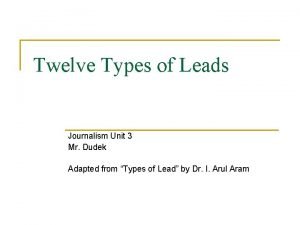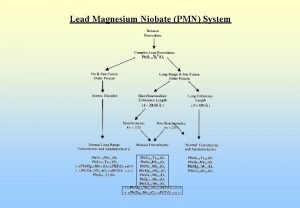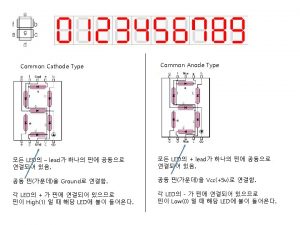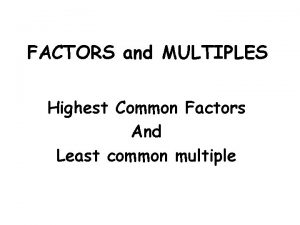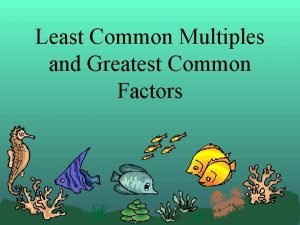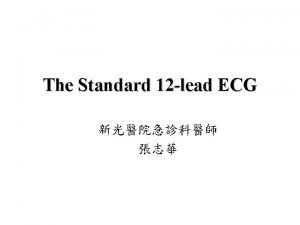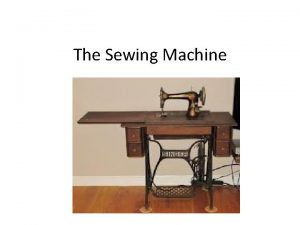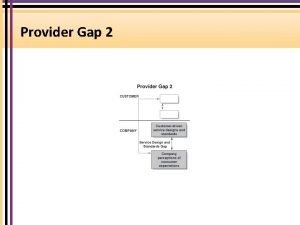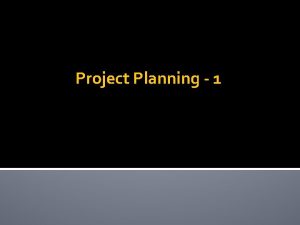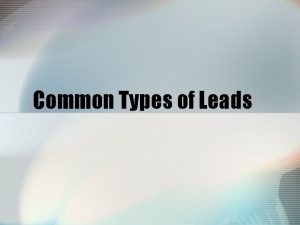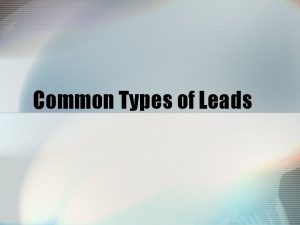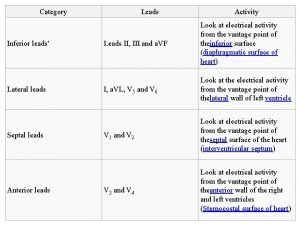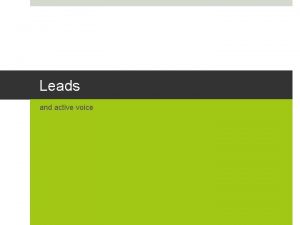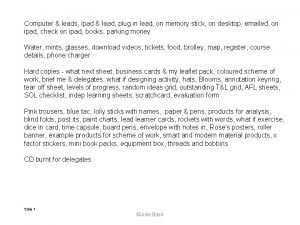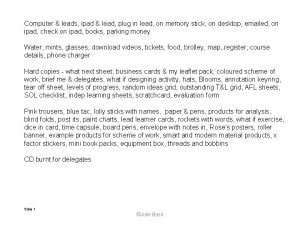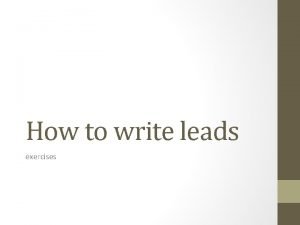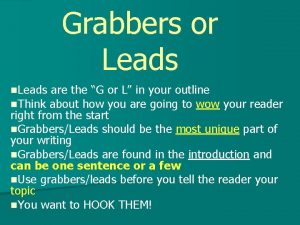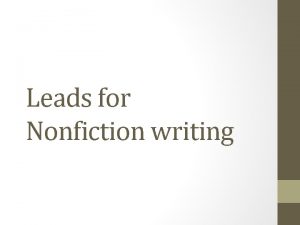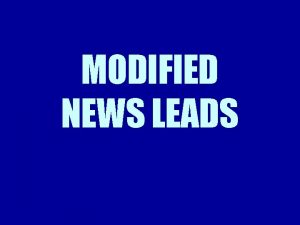Common Types of Leads THE LEAD The lead

























- Slides: 25

Common Types of Leads

THE LEAD The lead is the beginning or introduction to your story. It gives the reader a preview of what your story will be about. Why is a powerful lead so important? A lead is what draws the reader into your story. A good lead hooks readers from the beginning and makes them excited to continue reading.

Effective Leads • • Action Lead Character Lead Fact Lead Opinion Lead Question Lead Dialogue or Quote Single Word Lead

Once upon a time…. . My name is… and I’m going to write about…



_____ Lead: Someone is pictured. Ex. The old man sat on a bench reading a newspaper. He was dressed up in a suit and tie. The only odd thing about him was the baseball cap that sat backward on his head.

_____ Lead: A piece of ______ is given. Ex. The largest crossword puzzle ever published had more than 5000 clues across and a similar number down.

_____ Lead: A belief is stated. Ex. Cats are a thousand times smarter than dogs.



_________ Lead: Words are taken from another context. Ex. “Always chew your food slowly, ” my mother says.

_____ Lead: An important word is set off by itself, and then followed by explanatory sentences. Ex. Mud was everywhere. It was on the rug. It was on the furniture. I have never seen so much mud in my life. **Interjections are good examples of this kind of lead. ** Examples of Interjections are. . .

An interjection is a word used to get attention or express a feeling. Examples: Wow! Yahoo! Ouch! Yuk! Yum! Without them you would have lots of trouble saying how you feel.


10. It was a dark and stormy night (Cliché) 9. Let me tell you about. . . (just get to the point) 8. This weekend I. . . (ho-hum) 7. My topic is. . . (just make a statement that clues us in) 6. Once upon a time. . . (Brothers Grimm have that copyrighted already)

5. I feel that. . . (just make a statement that clues us in) 4. I think that. . . (ditto) 3. The dictionary defines (topic) as. . . (a real show stopper—NOT!) 2. (Topic) is a very exciting thing. (Show us, don’t tell us) 1. Hello, my name is. . . (if it’s a letter, we’ll figure that out; if it’s not, your name is listed as author under the title)

Practice Writing Assignment: Choose two of the following topics to practice writing. Use two different effective leads.

Lake Tahoe

Disneyland

Mc. Donald’s

A Famous Person

Outdoor Education

Effective Beginnings: • Action • Description of characters • State a fact • Opinion Lead • Question Lead • Dialogue or Quote • Single Word Lead Writing Topics: • Lake Tahoe • Disneyland • Mc. Donald’s • A Famous Person • Outdoor Education

Now knowing the common types of leads and worst kinds of introductions: q Choose two (or three) of the common leads to introduce your personal narrative. (Introductions are a paragraph in length not one sentence. ) q Draft due Monday. Be prepared to share.
 Q wave in ecg
Q wave in ecg Anecdotal lead journalism
Anecdotal lead journalism The three types of claims
The three types of claims Types of leads
Types of leads Lead magnesium niobate
Lead magnesium niobate Common factors that can lead to food poisoning
Common factors that can lead to food poisoning Factors and multiples of 42
Factors and multiples of 42 Common anode and common cathode
Common anode and common cathode Factor tree of 28
Factor tree of 28 Factors of 54
Factors of 54 What is the least common multiple of 18 and 27
What is the least common multiple of 18 and 27 Highest common factors and lowest common multiples
Highest common factors and lowest common multiples Einthoven triangle
Einthoven triangle What part of sewing machine leads the balance wheel
What part of sewing machine leads the balance wheel Luther leads the reformation answer key
Luther leads the reformation answer key Hql lead generation
Hql lead generation One road leads to london
One road leads to london Hard and soft standards examples
Hard and soft standards examples Adequate planning leads to the correct completion of work
Adequate planning leads to the correct completion of work Leon leads teacher evaluation score
Leon leads teacher evaluation score Right evaluation
Right evaluation Leads provides access to
Leads provides access to Example of punch lead
Example of punch lead Ecg block diagram
Ecg block diagram Finding job leads
Finding job leads I see all leads
I see all leads

